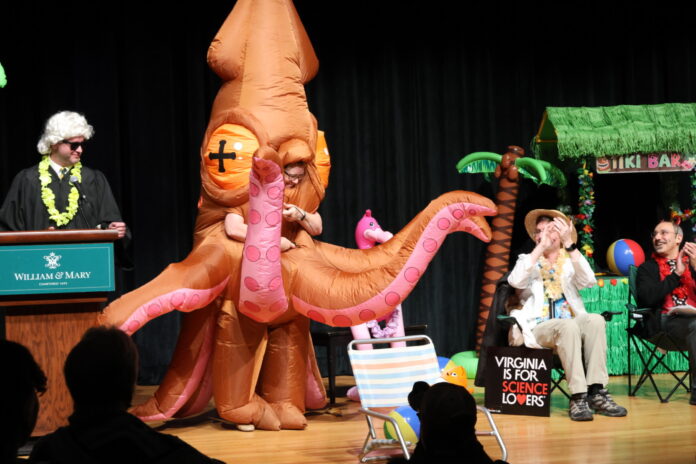Monday, Oct. 28, William and Mary’s Raft Debate returned to the Commonwealth Auditorium after a four-year hiatus, drawing nearly 1,000 attendees eager to experience a lively academic showdown filled with humor and intellectual exchange. Three professors from different academic disciplines competed for the one-person life raft, aiming to prove their field’s value in saving humanity.
Arts and Sciences Assistant Dean for Graduate Studies Trey Mayo Ed.D. ’22 served as both judge and emcee, while a Devil’s Advocate challenged everyone’s cases, arguing that no one should leave the island for humanity.
Since its inception in the 1960s, the Raft Debate has been a beloved campus tradition. Faculty representatives from across disciplines compete, often with humor and creativity, to demonstrate their academic field’s necessity in the survival of civilization.
Associate professor of classical studies Jessica Paga began by asserting that humanities provide the foundation for civilization by fostering a sense of connection and happiness.
“The thing that brings us together is community,” Paga said.
Professor of physics Joshua Erlich, representing the sciences, emphasized the role of scientific progress in combating global challenges like climate change and advancing public health.
“There’s a reason you remember the names Albert Einstein, Marie Curie, Charles Darwin and Shantá Hinton,” Erlich said. “You remember their names because of the great work that they’ve done.”
Associate professor of psychological sciences Jennifer Stevens advocated for the social sciences, highlighting their role in improving quality of life through insights into human behavior.
“If we are to save humanity, it feels so obvious we must save ourselves, and the social sciences, being the study of ourselves, quickly becomes the only choice,” Stevens said.
To demonstrate her point, Stevens performed a “La La Land”-inspired dance, drawing laughter and applause from the audience.
The Devil’s Advocate, Leslie and Naomi Legum Distinguished Professor of Philosophy Joshua Gert, encouraged the audience to consider the importance of balanced academic discourse.
“The sad truth is, if we are going to have academic disciplines at all, we need all of them working together, and that is no longer an option,” Gert said.
In the rebuttal round, Paga referenced Socrates’ trial and its consequences for Athens as a cautionary tale about the danger of rejecting a humanist approach. According to Paga, determining the winner was about ensuring humanity not only survives, but thrives.
“Choose the option that actually makes you happy, the thing that you actually really want to do with your life, with the amount of time you have left here,” Paga said.
Erlich countered Paga’s argument by illustrating the practical ways science enables modern society to thrive, arguing that scientific innovation provides the foundational tools that civilization relies on.
“Without me, you don’t survive. You need to vote for me for your kids and for your future,” Erlich said.
Citing research on altruistic behaviors in rats, Stevens built on Paga and Erlich’s arguments. She asserted that social sciences bridge scientific understanding and human fulfillment, equipping people with knowledge to live enriched lives both individually and collectively.
“We need to understand how humanity can build a culture of community and support and belonging,” Stevens said.
In response, Gert critiqued the contributions of each discipline, suggesting that while the sciences often create crises they must later solve, the humanities and social sciences focus primarily on interpreting behavior rather than actively ensuring survival.
“Advanced study in the absence of other fields of study presents the greatest danger,” Gert said. “Let people thrive. Keep these guys on the island.”
Following these exchanges, the audience posed questions on discipline-specific strengths. Paga explained that even infrastructure has roots in the humanities, stemming from early societal needs for order and public health.
Stevens responded to questions about psychology’s replicability, defending its scientific rigor despite occasional critiques. When asked how they’d maintain sanity on the raft, Paga proposed storytelling, citing Homer’s Iliad. Stevens pointed to cognitive-behavioral strategies, while Erlich confidently asserted that his knowledge of astronomy could guide him back to civilization.
Audience responses varied widely, from laughter and applause to thoughtful nods, reflecting the debate’s engaging nature and the audience’s investment in the discussion.
Olivia Webster ’26 believes that collaboration between all three disciplines would be necessary for survival.
“Labs and hands-on learning are critical, but a balance of fields keeps us well-rounded,” Webster said.
Associate professor of history and former raft debate winner Andrew Fisher commented on the unique merits of the humanities. He suggested that while science and technology offer practical applications, social sciences provide ethical and historical guidance, balancing progress with perspective.
“It provides the long view — understanding where humanity has thrived or faltered,” Fisher said.
Julie Walters ’25 added that psychology’s intersection with both science and humanities is particularly valuable to survival.
“Psychology bridges science and humanity, making sense of human behavior,” Walters said.
Jack Rizzo ’25 remarked that the debate was a highlight of his diverse and interdisciplinary student experience at a liberal arts institution such as the College.
“I’ve never felt more school pride,” Rizzo said.
Rizzo added that he hopes to see more disciplines included in future debates.
“I want to see some business school representation,” Rizzo said.
Executive Assistant to the Dean of Arts and Sciences Erica MacLeod collaborated with student coordinator Ukamaka Ozed-Williams ’25 to bring back the beloved tradition for the first time since the pandemic.
According to Ozed-Williams, despite the raft debate’s popularity and decades-long history, publicity was the biggest challenge in organizing the event.
“We lost an entire generation,” Ozed-Williams said. “When I asked people, nobody knew what it was.”
MacLeod’s creative flair included props like an inflatable squid and a tropical-themed set. As Ozed-Williams looks toward future raft debates, she encourages other students to join her in preserving this tradition.
CORRECTION (11/07/24): Article was updated to correct Trey Mayo’s title. A previous version of this article listed it as Ph.D ‘22 rather than Ed.D ‘22.

